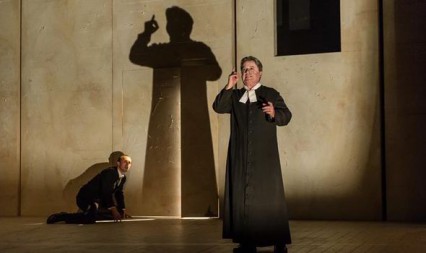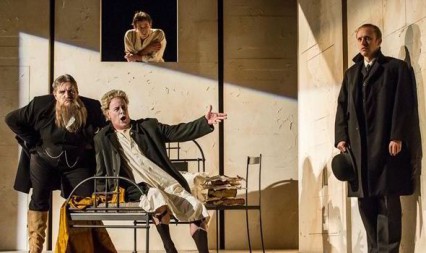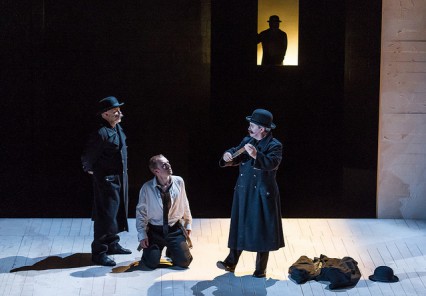Based on the classic novel by Franz Kafka, Philip Glass re-imagines a dystopian reality in his opera The Trial. Linda Christmas was on hand to review it.
Linbury Studio, Royal Opera House, Covent Garden, October 14 2014 (following the world première, October 10)
Composer: Philip Glass
Libretto: Christopher Hampton based on the novel by Franz Kafka
Director: Michael McCarthy
Conductor: Michael Rafferty
Cast: Josef K: Johnny Herford (baritone); Fräulein Bürstner /Leni: Amanda Forbes (soprano); Frau Grubach/wife of Court Usher: Rowan Hellier (mezzo soprano); Guard/usher/clerk of the court/Priest: Nicholas Folwell (bass-baritone); Inspector /Uncle: Michael Druiett (bass); Titorelli/flogger/student: Paul Curievici (tenor); guard/Block: Michael Bennett (tenor); Magistrate/lawyer Huld: Gwion Thomas (baritone).
The Trial opens with Josef K, tossing and turning in a hospital-type bed and finally ringing a bell and demanding: ‘Where is my breakfast?’ Such a banal utterance should be ill-suited to the inflated world of opera. But this is Kafka. This is Christopher Hampton’s brilliant pocket-adaptation of one of the world’s most famous books. To open with an arrogant-sounding protagonist demanding his breakfast is the first and last flash of the common-place, the ordinary, the hum-drum. It is a foil to what follows: two hours of psychological torture as Josef K is arrested for he knows not what, and who then spends a year staggering down a series of increasingly bizarre pathways, at first hoping that a mistake has been made, then slowly realising that he is trapped by the oppressive process of the law. All the pathways are dead-ends. The Trial is Kafka’s satire on the law, which he studied at university and then used to assess personal injury compensation. Anyone who has brushed against the law even in a routine way can identify with the powerlessness and even paralysis it engenders.

Photo Courtesy of Clive Barda
Christopher Hampton’s libretto is cogent, lucid, and at times witty. It is also remarkably faithful to the book – it even provides the opera’s structure. There are ten chapters in the book and the opera has ten scenes – filleted scenes. Hampton, who is a skilled adaptor of books to stage and screen, has once again achieved his aim of bringing the book to the boards. The Trial in German contains sentences that cover a whole page before finding a full stop! Although Hampton’s libretto is wordy by opera standards, his sentences are short, sharp and simple. And singable. Every word is crystal clear and not once is it necessary to look at the surtitles.
This is a major achievement for the librettist, the singers, and for Philip Glass, whose music supports voices rather than making them compete with the pit. Glass wants the words to be heard. ‘The words are everything,’ he told an audience at a Royal Opera House Insight evening just before the opening night. How refreshing it is to hear a composer say this. What a pleasure it is to hear Philip Glass, by far the most performed living composer of opera, admit this. (Operabase states that in the last five years, across the world, there have been 66 performance runs of 17 operas. John Adams is second with a mere 24 runs of 6 operas.)
The score for The Trial contains Glass’s instantly recognisable repetitive figurations and undulating arpeggios, but there is also musical magic for the interludes between the recitatives. The interludes are numerous but, alas, too brief. Just as one’s ear focuses on the flute playing a gorgeous phrase, or the xylophone offering a memorable moment, or a jaunty jazz tune emerging – it ends. As the work is word-based the result is decidedly recit-heavy. Indeed, there is only one aria. It comes towards the end as the Prison Chaplin makes it clear to Josef K in a complicated parable that there is no hope for him. At the Insight evening, Philip Glass said that the opera was building to this dramatic moment and that he hoped the aria would soon become one of the great bass arias. I was, therefore, eagerly awaiting this moment. It was disappointing. The earth did not quiver, and it should have done – particularly if the composer is aiming at a stand-alone aria. That was nothing to do with Nicholas Folwell’s fine performance and more to do with the way the lengthy parable is devoid of emotion and drains the drama.

Photo Courtesy of Clive Barda
Folwell was just one of the eight singers whose performance was deeply felt, well executed and finely acted. Most of the eight had multiple roles. All deserve plaudits, including conductor, Michael Rafferty, but particularly Johnny Herford as K who, having missed his breakfast, is on stage for the entire two hours. Amanda Forbes, who stunned all with her performance last year as the Duchess in The Killing Flower, was once again impressive and so too was Rowan Hellier. Paul Curievici provided the show’s most memorable scene as the painter, Titorelli: it offered more than a hint of the last act of Der Rosenkavalier with characters constantly popping out of windows and doors.
Philip Glass, Hampton and director Michael McCarthy wanted to play up the darkly comic side of The Trial, as McCarthy told Steph Power in an earlier issue of Wales Arts Review (2/24). The trio did not want to portray only the paranoia, the angst and misery, they wanted to emphasise the humour. When Kafka read the work to his chums they fell about laughing. We didn’t. It was hard to grasp the humour in this piece. Those around me were not even smiling. I laughed out loud once at a delightful moment when K and Leni, the lawyer’s nurse, start to grope each other, and two characters step forward and hold coats in front of them to save our blushes.

Photo Courtesy of Clive Barda
The set, by Simon Banham, was simple, designed for touring to a number of one-night stands. It consisted of a small, suitably claustrophobic plain box. If you were not familiar with the story, or had not read the programme notes, you might get a little lost in some of the scene changes.
This was an ambitious evening and Music Theatre Wales is to be congratulated for championing the works of living composers and on capturing the world première of The Trial.
The Trial will be broadcast on BBC Radio 3 on October 25 and released on CD by Orange Mountain Music.It can be seen at the following venues:
Aberystwyth Arts Centre, October 28
Oxford Playhouse, November 3
Basingstoke, Anvil, November 4
Cardiff, Sherman Cymru, November 7
Mold, Clwyd Theatre Cymru, November 9 (donors to the WA Review crowdfunding campaign can access tickets to this performance courtesy of MTW’s generosity).
Birmingham Rep, November 10










